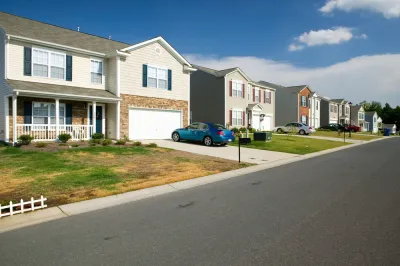A bill filed in early February would prohibit local governments in North Carolina from regulating the appearance of single family homes and duplexes.

Under North Carolina House Bill 36 and Senate Bill 25, design regulations would no longer apply to single family homes and duplexes without consent from neighborhood groups and property owners. The proposal includes some exceptions related to structural safety, historic preservation, and flood insurance programs, but the proposal is otherwise far-reaching, to be applied locally across a range of land uses, permitting classifications and zone districts.
In commercial districts (not included in the proposal), design regulations help ensure the form, appearance, and scale of new development is consistent with desired community character. In residential settings, design regulations help encourage variation, for example to discourage cookie-cutter development patterns in new subdivisions. The proposal is a backlash to more stringent design regulations used in some municipalities, which some feel are excessive.
The residential design standards legislation was introduced alongside another measure which would limit local government powers. House Bill 51 would end the use of extra-jurisdictional control. This refers to land use authority extending to areas just beyond city borders. In many instances these controls help facilitate transition from urban to rural character, for example in stepping-down density allowances. And if city services and infrastructure extend beyond city boundaries, it can make more sense for the municipality to administer local land use regulations. Some feel however, that because affected property owners cannot exercise voting power in the controlling jurisdiction, the practice is unwarranted.
All three proposals passed their first readings and have been referred to local government committees for further review.
FULL STORY: Cities, towns fight NC legislation that would limit their authority

Analysis: Cybertruck Fatality Rate Far Exceeds That of Ford Pinto
The Tesla Cybertruck was recalled seven times last year.

National Parks Layoffs Will Cause Communities to Lose Billions
Thousands of essential park workers were laid off this week, just before the busy spring break season.

Retro-silient?: America’s First “Eco-burb,” The Woodlands Turns 50
A master-planned community north of Houston offers lessons on green infrastructure and resilient design, but falls short of its founder’s lofty affordability and walkability goals.

Test News Post 1
This is a summary

Analysis: Cybertruck Fatality Rate Far Exceeds That of Ford Pinto
The Tesla Cybertruck was recalled seven times last year.

Test News Headline 46
Test for the image on the front page.
Urban Design for Planners 1: Software Tools
This six-course series explores essential urban design concepts using open source software and equips planners with the tools they need to participate fully in the urban design process.
Planning for Universal Design
Learn the tools for implementing Universal Design in planning regulations.
EMC Planning Group, Inc.
Planetizen
Planetizen
Mpact (formerly Rail~Volution)
Great Falls Development Authority, Inc.
HUDs Office of Policy Development and Research
NYU Wagner Graduate School of Public Service

























